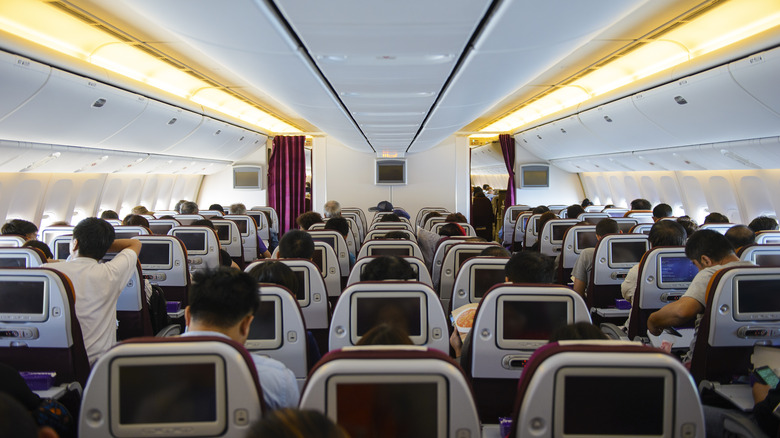This Airline Has Found Some Unusual And Effective Methods For Combatting Jet Lag
Desynchronosis — more commonly known as jet lag — occurs when our internal body clocks do not line up with the time zone changes that come with traveling long distances. The phrase "getting your days and nights mixed up" fits as well. It can be frustrating to be tired or awake at the wrong times of day, especially when you are trying to enjoy a vacation or get back into your normal schedule once you're home.
Many bleary-eyed travelers try to make jet lag easier to deal with after getting off the flight, like forcing themselves to stay awake until nighttime or wake up earlier. However, Qantas Airlines is looking to prevent jet lag even before the plane touches down. One method Qantas has tested involves changing the brightness of the plane's lights at different times during the flight. Plenty of lengthy flights do this already, but some Qantas flights are changing the plane's lights to acclimate passengers to the changing time zones as the flight progresses from point A to point B. Overall, Qantas wants to make a schedule for passengers on its long-haul flights, one that lines up with usual hours for activity and meals.
What and when you eat can affect jet lag
Sleep schedules are usually what we find to be affected by jet lag, but eating schedules can be disrupted by jet lag, too. In addition to changing the light schedule in the airplane, Qantas has also tried serving in-flight meals at times that align with the destination's time zone. It matters what passengers are eating too, given that some foods are more energizing than others. For example, Qantas started strategically serving meals consisting of carbohydrates when passengers should stay awake.
Most global passengers fly in economy or coach, which usually means tight quarters. Although this space factor might not seem like it could lead to stronger jet lag, Qantas wants everyone to have the ability to move around a bit more. In a press release, Qantas Group CEO Alan Joyce explained that allowing for more movement and even suggesting to passengers when to move around involved taking out some seats on the planes and adding a "Wellbeing Zone for Premium Economy and Economy passengers to stretch." Aside from combatting jet lag, movement in general is an effective health precaution for long flights, according to global travel expert Rick Steves.
The research is paying off
All of what Qantas aims to do in order to help people avoid severe symptoms of jet lag is coming from extensive research. The research project is called Project Sunrise and includes "sleep researchers, circadian experts, [and] nutrition and movement experts," says Peter Cistulli, a professor of sleep medicine at the University of Sydney. Project Sunrise tested these unique flights back in 2019, and passengers reported better sleep and even felt more alert in the days following the test flights. As an Australian airline, Qantas is definitely the perfect airline to research jet lag. Flights from this continent to the United States and Europe take upwards of 19 hours. Qantas is planning to start regularly running Project Sunrise intercontinental routes like one from Sydney to New York in late 2025.
If you do not find yourself on a Qantas Project Sunrise flight in the near future, there are still ways to implement its research findings in your quest to prevent jet lag. Be mindful of what you eat on the flight, and remember to get out of your seat every once in a while. You can use an eye mask to help time your sleep schedule to your destination's time zone, as well.


